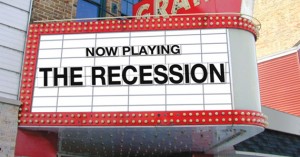 Marketing decisions are tough in a slow economy. As with every business sector right now, cuts are a constant threat and departments risk being asked to do even more with even less. Are more cuts the answer when it comes to marketing budgets? Absolutely not. Here we talk about why companies should utilize strategies that make the most of opportunities presented by recessions, rather than hiding from the challenges.
Marketing decisions are tough in a slow economy. As with every business sector right now, cuts are a constant threat and departments risk being asked to do even more with even less. Are more cuts the answer when it comes to marketing budgets? Absolutely not. Here we talk about why companies should utilize strategies that make the most of opportunities presented by recessions, rather than hiding from the challenges.
Incorporating Lessons From the Past
Study after study of past recessions have demonstrated that a commitment to marketing is a key factor for businesses that will see the other side of a recession. Indeed many companies found that they were able to not only survive, but actually thrive in the recession because of the ability to attain a greater proportion of the market share as other businesses fell by the wayside. In fact, a study by McGraw-Hill’s Research Laboratory of Advertising Performance that focused on six hundred industrial businesses operating during the 1981-1982 recession years, found that a significant number of companies which had maintained or boosted marketing budgets increased sales for years after the recession had ended.
It should come as no surprise that studies focusing on recessions in the 1970’s reiterate that same point; Cuts may be an inevitable component of the recession survival strategy, but the marketing department should not be a major candidate for those cuts. When it comes to marketing, investment is key.
Prioritizing the Customer-Business Relationship
The cornerstone of every business is its relationship with its customers. This is never truer than in times of economic uncertainty. For the average person nearly every activity is fraught with a sense of impermanence, and perhaps even hopelessness. Every day long-respected businesses are closing their doors. Consumers can hardly know which favorite restaurant or organization will still be around when they step outside.
Investment in fresh, engaging, targeted marketing during a recession lets consumers and clients know that there is something they can rely on. It communicates that the company is still here, and vital, despite the current woes of the day. Strong marketing during a period of recession projects an image of confidence. It sends a message that the consumer is desperate to hear: There is a safe space. An oasis exists, secure and unaffected by the pressures of the outside world. It says, “Everything is okay. We’re here for you.” If this message can be successfully communicated, customer loyalty will continue and likely become stronger.
Embracing Smart Innovation
While it is important to communicate a solid feeling of stability and dependability, marketers must be able to ensure that promoting these qualities does not lead to stagnation, in fact or perception. Part of conveying a sense of vitality involves maintaining a commitment to innovation, even if more apprehensive competitors batten down the hatches and maintain the status quo. Long-term plans may have to be put on hold, but it is more than possible to communicate to customers how current and nimble the organization is, without lavish investment. Effectively communicating this message comes down to two simple parts: knowing the audience and then taking those innovative steps forward, in a careful and measured way.
The first part of the equation involves the enhancement of understanding of the customer-base. This type of investigation can uncover a plethora of untapped resources, and is critical to improving customer service, sales strategies, and market share. Relationships with core customers should be strengthened in order to increase word of mouth advertising as well as repeat purchases. That being said, even with high-value customers, sales are likely to be lower due to economic constraints. Shape messages to demonstrate empathy for customers’ circumstances.
The second component involves utilizing that understanding to make affordable steps forward that not only take advantage of the evolving technological and social landscape, but also contribute to the company’s every-day goals. One excellent strategy could be an increased investment in environmental sustainability. While some might consider a recession an inappropriate time for “going green,” investments in environmentally conscious systems and materials can garner social capital and increase efficiency. In a 2010 study entitled, “If and how environmental friendliness can be a profitable marketing strategy in the current recession” researchers found that:
The green marketing strategy is profitable even in recession as it is a great source of competitive advantage and numerous profitable opportunities. This commitment to the environment in hard times yields favorable reputation and helps companies in developing new products; finding new markets and suppliers; expanding customer-base; improving processes and stores; enhancing efficiency; etc.
Regardless of the type of innovation at play, it has been said that fortune favors the bold. In these difficult economic times bold executives should paraphrase the words of Henry himself in Shakespeare’s Henry V, stating, “The fewer the men, the greater the (market) share of honor.”
